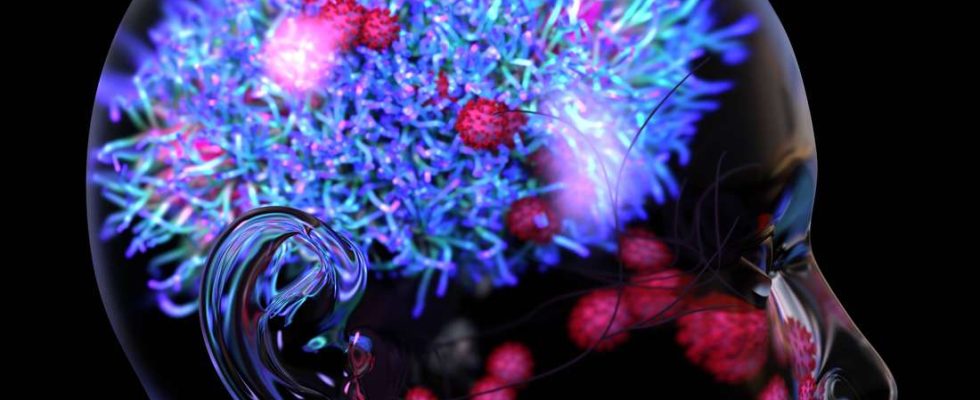Press
Corona can affect the release of dopamine in the brain. The result could be depressive moods, as is also known with Long Covid.
New York – Headaches and the loss of sense of smell and taste are among the well-known symptoms of a coronavirus infection that trouble many sufferers. Researchers also observe that sufferers have a higher likelihood of developing psychiatric disorders six months after becoming ill. This is what the authors of a study published in January refer to.
Effects of coronavirus on dopamine release
During the corona pandemic, there were already initial findings that the stress caused by lockdown and existential fears made broken heart syndrome, which is also related to dopamine, more likely. Now the authors of the study took a closer look at what effects the virus itself can have on dopamine release in the brain. It has long been known that Longcovid patients can suffer from brain damage.
About the study:
The study examined brain cells from autopsies of deceased people with and without coronavirus disease, as well as brain cells grown in the laboratory from donations from deceased people. “We show that midbrain dopamine (DA) neurons derived from human pluripotent stem cells (hPSCs) are selectively susceptible and permissive to severe acute respiratory syndrome coronavirus 2 (SARS-CoV-2) infection.” €œ, write the study authors in the summary of their results. The study comes from the Center for Genomic Health in New York. It was published in a specialist magazine Cell.com.
This is what dopamine does in the brain
As background: Dopamine is one of the chemical messengers that are used to pass on information in the brain. Dopamine is produced and released in a small collection of nerve cells in the midbrain – especially when a person experiences something unexpectedly positive. Endorphins are then released in a part of the reward system in the brain, the nucleus accumbens. These have an opium-like effect and make you happy. The dopamines, which themselves reach the frontal brain, cause increased concentration and learning ability.
Study shows brain problems after corona disease: neurons no longer release dopamine
The study examined cells from the lungs, heart and pancreas – but the researchers only found an abnormality in dopamine neurons in the brain. This was a surprise. It was discovered that neurons infected with the virus change: they no longer release dopamine, but instead send out chemical signals called inflammation. As the only cells examined, they would also lose the ability to grow and divide. The coronavirus had no effect on other neuronal cells.
Only about five percent of the cells exposed to the coronavirus would become infected. But, according to co-author Shuibing Chen: “Even a small group of infected cells can have potentially serious effects.” Further studies will now investigate whether there is a connection between these findings and Longcovid disease or the post-Covid disease. Covid syndrome exists. Because the reasons for Longcovid can be varied. There are also already studies using the drugs riluzole, metformin and imatinib to see whether they can stop the growth of dopamine-producing cells. (cat)
.

